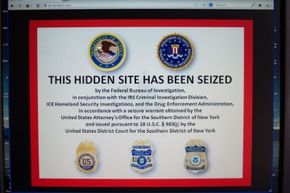What a tangled web we weave, indeed. About 40 percent of the world's population uses the Web for news, entertainment, communication and myriad other purposes [source: Internet World Stats]. Yet even as more and more people log on, they are actually finding less of the data that's stored online. That's because only a sliver of what we know as the World Wide Web is easily accessible.
The so-called surface Web, which all of us use routinely, consists of data that search engines can find and then offer up in response to your queries. But in the same way that only the tip of an iceberg is visible to observers, a traditional search engine sees only a small amount of the information that's available -- a measly 0.03 percent [source: OEDB].
Advertisement
As for the rest of it? Well, a lot of it's buried in what's called the deep Web. The deep Web (also known as the undernet, invisible Web and hidden Web, among other monikers) consists of data that you won't locate with a simple Google search.
No one really knows how big the deep Web really is, but it's hundreds (or perhaps even thousands) of times bigger that the surface Web. This data isn't necessarily hidden on purpose. It's just hard for current search engine technology to find and make sense of it.
There's a flip side of the deep Web that's a lot murkier -- and, sometimes, darker -- which is why it's also known as the dark web. In the dark Web, users really do intentionally bury data. Often, these parts of the Web are accessible only if you use special browser software that helps to peel away the onion-like layers of the dark Web.
This software maintains the privacy of both the source and the destination of data and the people who access it. For political dissidents and criminals alike, this kind of anonymity shows the immense power of the dark Web, enabling transfers of information, goods and services, legally or illegally, to the chagrin of the powers-that-be all over the world.
Just as a search engine is simply scratching the surface of the Web, we're only getting started. Keep reading to find out how tangled our Web really becomes.
Advertisement




